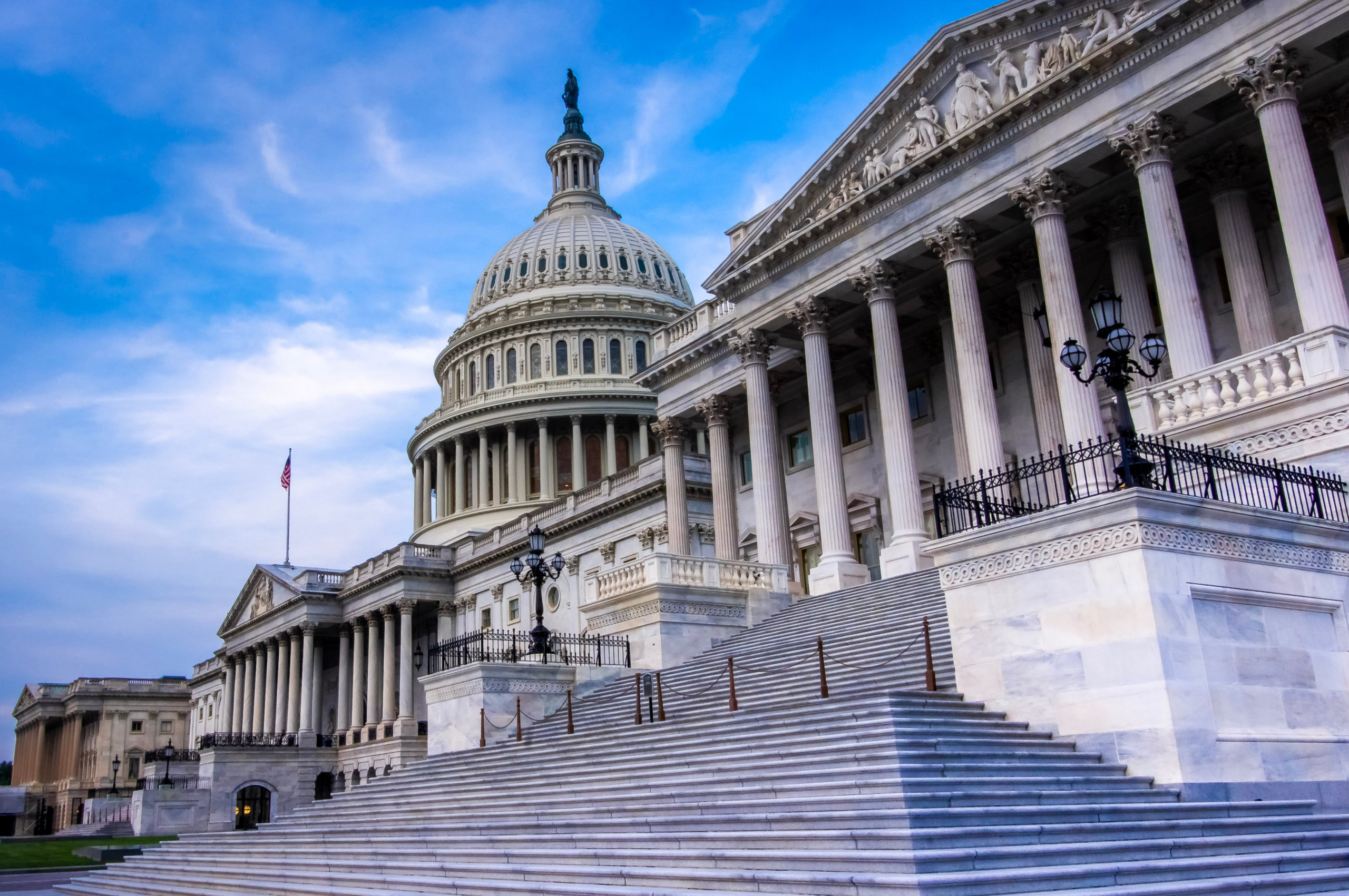Our new survey provides messaging guidance for progressive communicators navigating the public response to the government shutdown.
There are 3 key takeaways:
- The shutdown touched millions of Americans, and they have had enough of government shutdowns as a political tactic;
- Of a shutdown’s many consequences, those punishing ordinary people or putting public safety at risk cause the deepest concerns;
- The best argument against a future shutdown emphasizes that policy debates should not be hostage negotiations or selfish endeavors by the president.
The shutdown entered the public consciousness in ways other political controversies did not, and Americans say “enough.”
It was a major event: 71% percent of Americans have heard “a lot” about the five-week-long shutdown, the longest in history. A political event that makes this kind of impact is a rarity.
- Our post-election November poll found that just 28% had heard a lot about the firing of Attorney General Jeff Sessions.
- As of May 2018, a whole year after Robert Mueller’s appointment, only 49% of Americans had heard a lot about the Special Counsel investigation.
- Even the family separation crisis, ongoing for months when Navigator asked about it in July 2018, was very familiar to only 60% of Americans.
One thing that may set the shutdown apart from other major political controversies is how many people saw its impacts firsthand: a third (34%) report knowing someone directly affected by the shutdown or else having been personally affected themselves.
There is also agreement about who was responsible for allowing the shutdown to last as long as it did. Fifty-three percent (53%) of Americans blame President Trump and his Republican allies in Congress over Democrats (39%). While partisans unsurprisingly blame the other side, more independents blame Trump and the GOP (48%) than blame Democrats (34%).
Despite President Trump and his allies trying to make the shutdown about his border wall, the public is widely opposed to shutting down the federal government as a negotiation tactic. Americans widely reject the use of shutdowns “even if it’s for an important issue or cause” they believe in, with nearly all Democrats, but also 71% of independents and even 43% of Republicans in agreement.
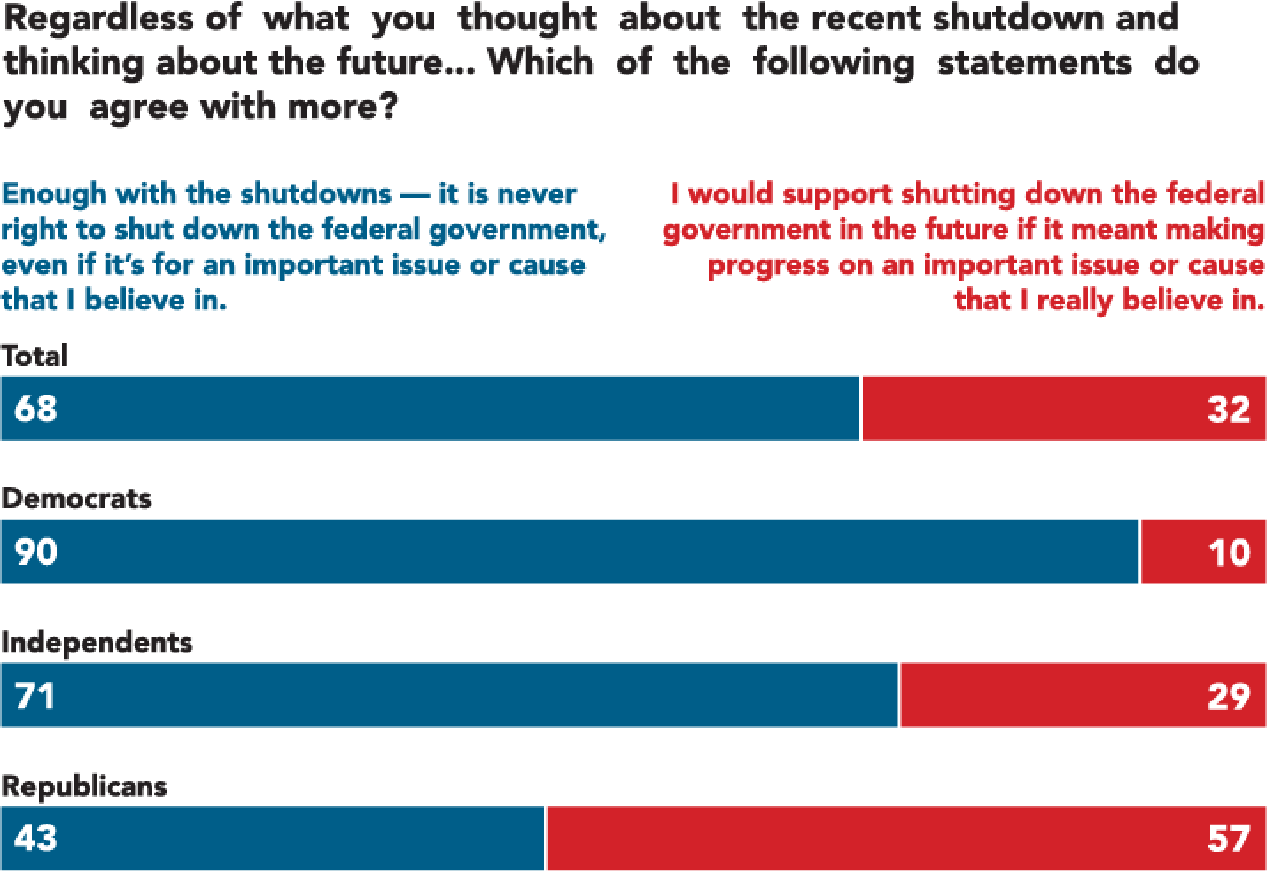
On the brink of another shutdown, progressives should focus on nearer-term, urgent matters of unpaid workers’ personal finances and public safety.
During the shutdown, there was a steady stream of news covering its many consequences, such as national parks and monuments closing across the country, billions of dollars in lost economic activity, and potential cuts to food assistance affecting millions. Yet from a list of consequences, Americans showed the most concern for those going without paychecks and for safety services not getting done.
Messaging on the broader economic impact of the shutdown should not be abandoned forever. Public perception of the strength the economy is down nine percentage points from +22 net positive in December. And when asked which consequence from the shutdown concerned people the most – harm to federal workers, harm to the economy, harm to one’s own life, and public safety – the economy came second. This may be an argument for the long term; but in the short term, Americans are more preoccupied with the immediate pain and risks.
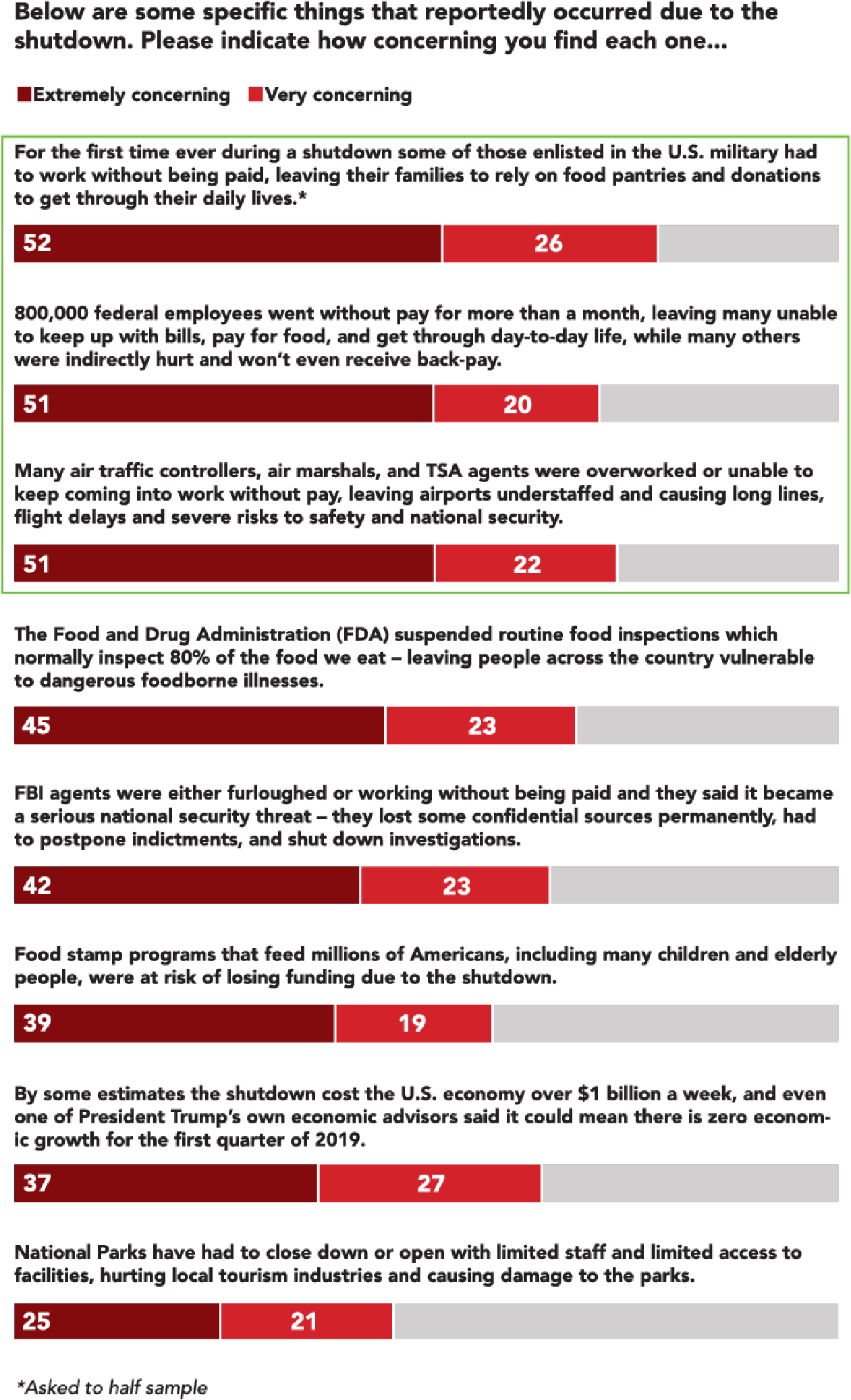
Looking ahead, the most convincing arguments against a shutdown put Trump’s political gamesmanship and selfishness at the center of the debate.
President Trump declared in December he would be proud to initiate a shutdown in the name of border security, and he later called his demand for a wall a response to an urgent crisis. But many Americans don’t believe these were his real motivations and are most persuaded by the case that he was driven by stubbornness and ego.
Of four messages tested, the most effective messaging emphasizes that Trump’s shutdown hurt people for the sole purpose of him getting his way. Overall, 59% of Americans find this argument convincing; 43% found it very convincing, suggesting this is a stronger than an argument that emphases a wall being ineffective (32% very convincing). The key to the argument is who Trump’s shutdown hurt and why he hurt them: “The bottom line is that Donald Trump took the paychecks of hundreds of thousands of Americans hostage and was hurting people to try to get what he wants. It was wrong and it should not be rewarded.”
Hurting people for political gain is an especially persuasive argument with a critical group of independent and Republican voters who blame Trump for the shutdown. This already cross-pressured group – call them “Non-Democratic Doubters” – make up 13% of the electorate but are almost unanimous (93%) in finding the argument about hostage-taking convincing. Seven in ten (71%) find it “very” convincing, 21 points ahead of the next-best argument with this group. The argument is also the strongest with independents (59% convincing, 43% very) and white voters without a college degree (49% convincing, 35% very), a group that tends to be more supportive of Trump. The second-best argument makes it even more explicit about motivations: for Trump this isn’t about border security – it’s about Trump.
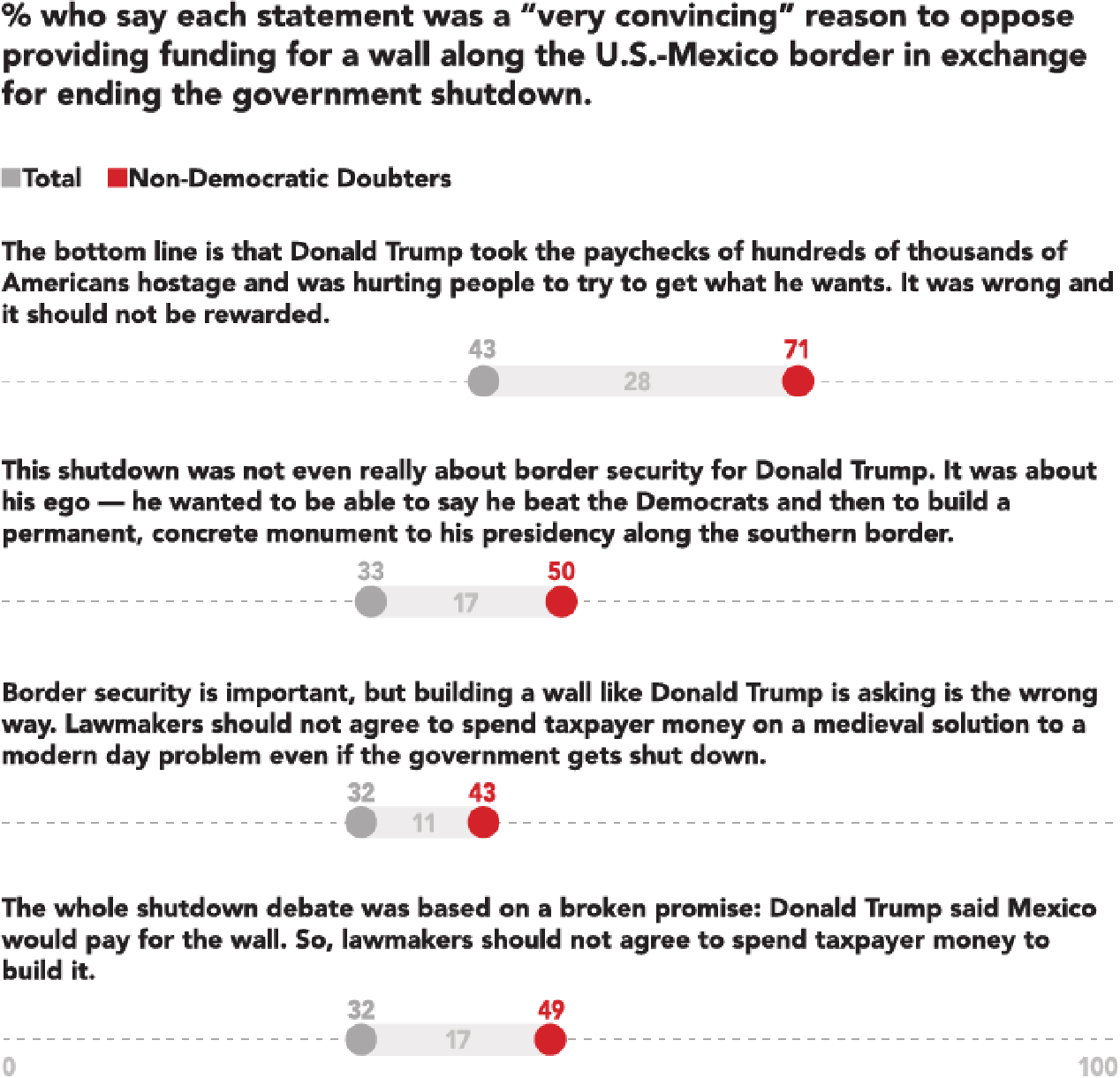
Americans side with the argument that Democrats “have already shown they care about border security” over “they should take Donald Trump’s concerns… more seriously” (52% to 48%). But this margin is narrower than the 36-point margin by which Americans say, “enough with the shutdowns,” or the 28-point margin by which they say Trump is bringing out the worst in Washington – a sentiment shared by political independents and even a narrow majority of white non-college Americans. Progressives should be diligent in keeping conversations about the shutdown centered on the people more than the policy matter.
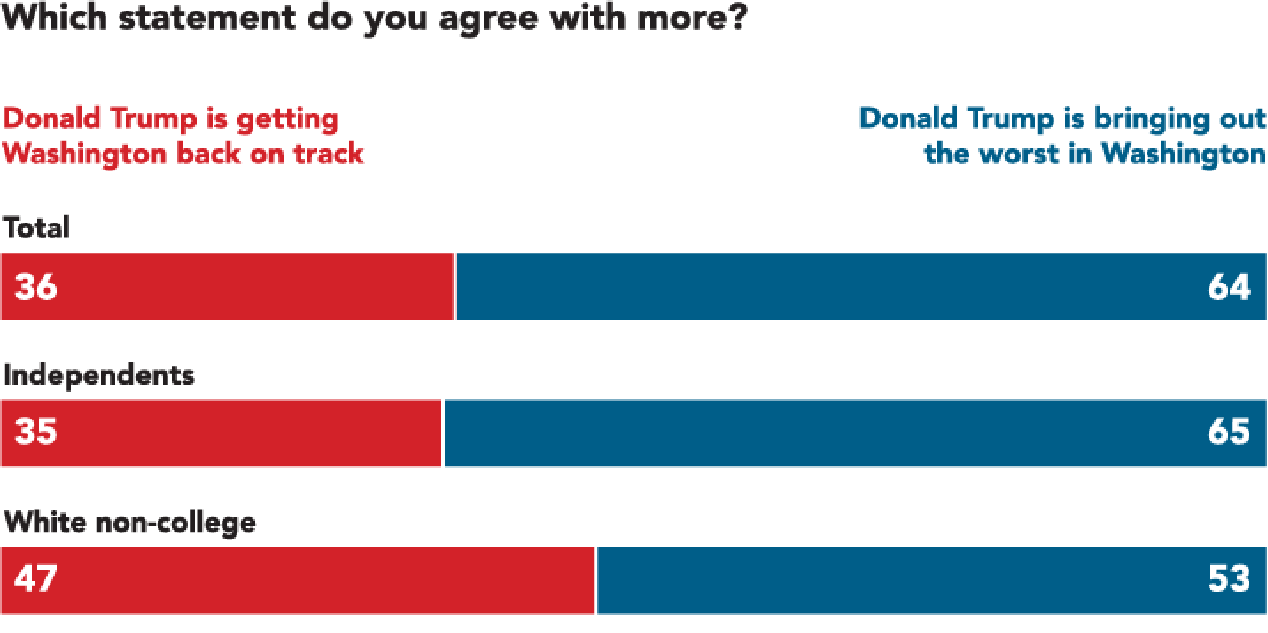
The bottom line: While progressives can, and should, continue to make their case about border security and the problems with Trump’s wall, they should make habit of punctuating every conversation by highlighting the motivations behind the shutdown and the immediate consequences for working families. This is where progressive messaging best resonates with the public.
